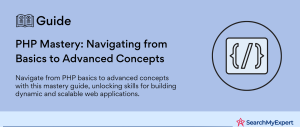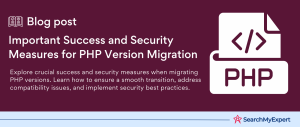The Significance of Error Handling and Debugging in PHP
In the ever-evolving world of web development, PHP stands out as a robust server-side scripting language, powering a significant portion of the internet. At the heart of its efficiency and reliability lies an often-overlooked aspect: error handling and debugging. This introductory step delves into the importance of these practices and provides an overview of PHP’s error-handling mechanisms, setting the stage for a deeper exploration in the following sections.
Ensuring a Positive User Experience through Effective Error Handling
Error handling is not merely a technical necessity; it is a cornerstone of user satisfaction. In PHP, effective error handling ensures that users are not confronted with confusing or intimidating system messages. Instead, they experience a smooth, uninterrupted interaction with your application. By gracefully managing errors, PHP developers can maintain a professional and user-friendly interface, crucial for retaining users and building trust.
Boosting Debugging Efficiency and Troubleshooting Speed
Speed and efficiency in debugging are vital for any PHP developer. The ability to quickly identify, understand, and rectify errors significantly reduces downtime and enhances productivity. PHP’s error-handling tools are designed to provide clear, concise information about issues, enabling developers to address them promptly. This rapid response capability is essential in a fast-paced development environment, where time is often of the essence.
Upholding Code Quality and Stability
The stability and quality of your PHP code are directly impacted by how well you handle errors. Effective error-handling practices prevent minor issues from escalating into major system failures. By catching and managing errors early, developers can ensure that their code remains robust and reliable, reducing the likelihood of crashes and enhancing the overall performance of their applications.
Understanding PHP’s Error Handling Mechanisms
PHP offers a comprehensive set of error-handling mechanisms, allowing developers to effectively manage and respond to various issues that may arise during execution. Understanding these mechanisms is key to leveraging PHP’s full potential.
Levels of Errors in PHP
PHP categorizes errors into different levels, each signifying the severity and nature of the issue. These include:
- E_ERROR: Critical run-time errors that halt script execution.
- E_WARNING: Run-time warnings that do not stop the script.
- E_PARSE:
Compile-time parse errors. - E_NOTICE:
Run-time notices indicating possible errors. - E_CORE_ERROR, E_CORE_WARNING, E_COMPILE_ERROR, E_COMPILE_WARNING, and others that are specific to PHP’s internal workings.
Each error level plays a specific role in how PHP interprets and responds to various issues, making it crucial for developers to understand these distinctions.
Built-in Error Reporting and Logging Functionalities
PHP is equipped with built-in functionalities for error reporting and logging, providing developers with essential tools to monitor and troubleshoot their applications. These functionalities include:
- Error Reporting: This feature enables developers to specify which error levels should be reported and which should be ignored. It’s a flexible tool for controlling the amount of information provided during the development and production stages.
- Error Logging:
PHP can log errors to a file or other output, such as a web browser. This is invaluable for tracking down issues, especially in a production environment where displaying errors to end-users is not desirable.
Decoding Common PHP Errors: Navigating Through the Maze of Code Challenges
PHP, with its extensive capabilities, can sometimes be daunting due to the variety of errors that developers may encounter. Understanding these errors is crucial for efficient PHP development. This section categorizes and explains common PHP errors, providing insights into their causes and implications.
Syntax Errors: The Bane of PHP Code
Syntax errors are like stumbling blocks in PHP coding. They usually arise from:
- Missing Semicolons: A very common issue where a semicolon (;) is omitted at the end of a statement.
- Typos:
Simple typing mistakes in variable names, function names, or language constructs. - Incorrect Function Calls:
Using functions incorrectly, such as wrong number or type of arguments.
Runtime Errors: When Your PHP Code Meets Reality
Runtime errors occur as your PHP script executes. They can be diverse, including:
- Division by Zero:
An attempt to divide a number by zero, which is mathematically undefined. - Undefined Variables: Using a variable that has not been declared or initialized.
- File Access Issues: Problems encountered when opening, reading, or writing to files, often due to incorrect file paths or insufficient permissions.
Logic Errors: Correct Syntax, Incorrect Logic
Logic errors are the most elusive, as they don’t produce explicit error messages. They manifest as:
- Unexpected Results:
The script runs but yields incorrect or unexpected results. - Incorrect Assumptions:
Errors due to incorrect assumptions made by the developer about how a particular piece of code should work. - Flawed Algorithms:
Mistakes in the logic or algorithm used to solve a problem.
Fatal Errors: The Showstoppers
Fatal errors are critical issues that cause the PHP script to terminate immediately. They include:
- Unrecoverable Issues: Such as calling a non-existent function, or class, or running out of memory.
- Script Termination:
The script stops executing, and depending on the PHP configuration, an error message may be displayed.
Essential Error Handling Techniques in PHP for Robust Applications
Effective error handling in PHP is crucial for creating reliable and user-friendly applications. This segment focuses on fundamental error handling techniques, including error reporting configuration, the use of try-catch blocks for error capture and handling, and the implementation of custom error messages and logging.
Configuring Error Reporting in PHP
The first step in robust error handling is configuring error reporting settings. These settings are pivotal in identifying issues during the development phase and managing how errors are handled in production. Key considerations include:
- Enabling Error Reporting (E_ALL): This configuration is essential for developers to identify and address all possible errors, warnings, and notices that may arise in the code. It ensures that no issue goes unnoticed during the development phase.
- Setting Display Options:
The manner in which errors are displayed plays a significant role in both development and production environments. While it’s beneficial to display errors directly on the page during development for immediate feedback, in a production environment, it’s best practice to log errors to a file to avoid exposing sensitive information to end-users.
Error Capture and Handling Using Try-Catch Blocks
Try-catch blocks in PHP are a cornerstone of exception handling. They allow developers to:
- Capture Specific Errors: By wrapping potentially problematic code in a try block, any exceptions thrown within can be caught and handled gracefully in the catch block.
- Prevent Application Crash: Using try-catch blocks helps prevent the entire script from crashing due to an unhandled exception, thereby enhancing the application’s robustness.
Creating Custom Error Messages and Logging
Custom error messages and logging are essential for both developers and users:
- Informative Error Messages:
Tailored error messages help in pinpointing the exact issue, making debugging easier. They also provide a better user experience by informing users about the nature of the error in a non-technical, user-friendly manner. - Logging Errors for Analysis:
Keeping a log of errors is invaluable for post-mortem analysis. It helps in identifying patterns, understanding the context of errors, and planning preventive measures for future occurrences.
Elevating PHP Development with Advanced Error Handling Strategies
Progressing beyond basic error handling, advanced strategies in PHP are essential for sophisticated and robust application development. This section delves into the implementation of global error handlers, the creation of custom error classes and exceptions, and adheres to best practices in error logging. These advanced tactics empower developers to manage errors more effectively and maintain high-quality code standards.
Implementing Global Error Handlers
Global error handlers are a powerful tool in PHP, enabling developers to:
- Handle All Uncaught Exceptions:
By setting a global error handler, you can catch and manage exceptions that are not addressed by specific try-catch blocks. This ensures a comprehensive handling mechanism across your application. - Centralized Error Management:
A global error handler function serves as a centralized point for managing errors, making the error handling process more organized and consistent.
Creating Custom Error Classes and Exceptions
Custom error classes and exceptions allow for more refined control over error management:
- Bespoke Error Types: By defining custom error classes, developers can create specific error types that are tailored to the unique needs of their application. This specificity aids in pinpointing issues more accurately.
- Enhanced Readability and Maintenance: Custom exceptions make the code more readable and maintainable, as they clearly indicate the nature and context of an error.
Error Logging Best Practices
Effective error logging is a cornerstone of good error management. Adhering to best practices in error logging involves:
- Choosing Appropriate Logging Mechanisms:
Selecting the right tool for error logging is crucial. Whether it’s a simple file-based logging or a more sophisticated logging system like syslog, the choice depends on the application’s complexity and requirements. - Analyzing Logged Errors:
Regular analysis of logged errors is vital for proactive error management. It helps in identifying recurring issues, understanding their root causes, and planning preventive measures to enhance the application’s stability.
Harnessing Debugging Tools and Resources for Optimal PHP Development
Effective debugging is a critical component of PHP programming, allowing developers to swiftly identify and resolve issues. This section highlights the utilization of key debugging tools and resources, including Xdebug, PHP’s error_log function, the var_dump and print_r functions, and stack traces. Each of these tools plays a vital role in the debugging process, providing insights into the inner workings of PHP code and facilitating a more efficient problem-solving approach.
Xdebug: A Game-Changer in PHP Debugging
Xdebug stands out as a powerful and widely used debugger in the PHP ecosystem. It enhances the debugging experience by offering:
- Real-Time Code Execution Analysis:
Xdebug provides an in-depth look at how PHP code executes in real time. This allows developers to step through their code, line by line, to examine the flow of execution and identify where issues may arise. - Advanced Features: With capabilities such as breakpoint setting, stack traces, and variable inspection, Xdebug transforms the debugging process into a more manageable and insightful task.
PHP error_log: Detailed Error Tracking
The error_log function in PHP is a straightforward yet effective tool for error monitoring. It enables developers to:
- Write Detailed Error Messages:
By logging detailed error information to a dedicated file, developers can keep a comprehensive record of errors that occur, which is invaluable for post-mortem analysis and troubleshooting. - Facilitate Error Tracking:
Having a dedicated log file for errors simplifies the process of tracking down and addressing issues, especially in a production environment.
Var_dump and print_r: Variable Inspection at Runtime
Understanding the state of variables at specific points in the code is crucial for debugging. The var_dump and print_r functions are essential for this purpose:
- Var_dump:
Provides detailed information about a variable, including its type and value. This function is particularly useful for debugging complex data structures like arrays and objects. - Print_r:
Offers a more readable format for displaying information about a variable, which can be more convenient for simpler data types or when a quick overview is needed.
Stack Traces: Unraveling the Call Chain
Stack traces are invaluable in debugging, as they:
- Reveal the Call Chain: By showing the sequence of function calls that led to a specific point in the code, stack traces help developers understand the context in which an error occurred.
- Aid in Pinpointing Errors:
By providing a roadmap of the execution flow up to the point of an error, stack traces enable developers to quickly identify and address the root cause of the problem.
Enhancing PHP Development with Debugging Best Practices
Effective debugging in PHP goes beyond using tools; it involves a strategic approach to identifying, understanding, and resolving errors. This section outlines essential debugging best practices, focusing on pinpointing the source of errors, testing and replicating issues, refining code through refactoring, and documenting errors and solutions for future reference. By adhering to these practices, developers can significantly improve their troubleshooting efficiency and code quality.
Identifying the Source of Errors
The first step in effective debugging is accurately identifying the source of the problem. This involves:
- Analyzing Error Messages, Logs, and Stack Traces:
Careful examination of error messages, logs, and stack traces is crucial. These resources provide valuable clues about the nature and location of errors, guiding developers toward the root cause. - Understanding the Context: It’s essential to not just look at the error itself but to understand the context in which it occurred. This holistic view helps in forming a more accurate diagnosis of the issue.
Testing and Replicating Errors
Once potential sources of errors are identified, the next step is to test and replicate the issues:
- Re-creating the Scenario: By replicating the exact conditions under which the error occurred, developers can confirm the issue’s existence and understand its behavior. This step is vital for ensuring that the subsequent fixes address the problem effectively.
- Isolating Variables:
Changing one variable at a time during replication can help pinpoint the exact cause of the error, making the debugging process more efficient.
Code Refactoring and Preventive Measures
Resolving errors often requires refining the code:
- Improving Code Structure: Refactoring code can not only fix the immediate error but also enhance the overall structure and readability of the code, reducing the likelihood of future errors.
- Avoiding Common Errors: Awareness of common pitfalls in PHP programming and proactively implementing preventive measures can save time and effort in the long run.
Documenting Encountered Errors and Solutions
Finally, documentation plays a crucial role:
- Creating a Knowledge Base:
Documenting both the errors encountered and the solutions applied creates a valuable resource for future reference. This can be particularly helpful when similar issues arise later, providing a quick reference to proven solutions. - Sharing Knowledge: By documenting and sharing these experiences, developers can contribute to the collective knowledge within their team or the broader PHP community, fostering a culture of learning and collaboration.
Embracing the Future of PHP Development: A Conclusion on Error Handling and Debugging
As we conclude this comprehensive exploration of error handling and debugging in PHP, it’s important to reflect on the broader implications and best practices that define robust PHP development. This final section underscores the significance of continuous learning, the balance between error handling and performance, and the value of a proactive approach to error management.
The Imperative of Continuous Learning and Improvement
In the dynamic realm of PHP development, staying current is not just beneficial; it’s essential. This involves:
- Keeping Up with New PHP Features:
PHP is an ever-evolving language with regular updates and new features. Staying abreast of these changes ensures that developers can leverage the latest functionalities and improvements. - Advancing Debugging Techniques:
As new debugging tools and techniques emerge, incorporating them into your development workflow can significantly enhance your ability to efficiently identify and resolve issues.
Balancing Error Handling with Performance
While robust error handling is vital, it’s equally important to maintain optimal performance:
- Avoiding Excessive Error Checks: Implementing too many error checks can lead to unnecessary overhead, affecting the application’s performance. Striking the right balance is key.
- Optimizing Error Handling:
Employing efficient error-handling strategies that do not compromise on application speed and responsiveness is a hallmark of skilled PHP development.
The Value of a Proactive Approach to Error Management
Finally, adopting a proactive stance towards error management is crucial for building reliable PHP applications:
- Preventing Rather Than Reacting: Anticipating potential errors and implementing measures to prevent them can save significant time and resources, enhancing the overall stability of the application.
- Building Robust Applications:
A proactive approach to error handling contributes to the development of robust and dependable PHP applications, leading to a better user experience and higher user satisfaction.
Conclusion:
In this extensive guide, we’ve journeyed through the critical aspects of error handling and debugging in PHP, covering everything from basic error reporting configurations to advanced error management strategies. Emphasizing the importance of continuous learning, the balance between diligent error handling and maintaining performance, and adopting a proactive approach, this guide serves as a comprehensive resource for PHP developers aiming to enhance their skills. As the PHP landscape evolves, staying informed and adaptable is key to developing applications that are not only functional but also reliable and efficient. Remember, the path to mastery in PHP is an ongoing process, driven by a commitment to excellence and a deep understanding of these fundamental principles.
Innovate your digital landscape with our PHP Development Service.
Table of Contents
Toggle






